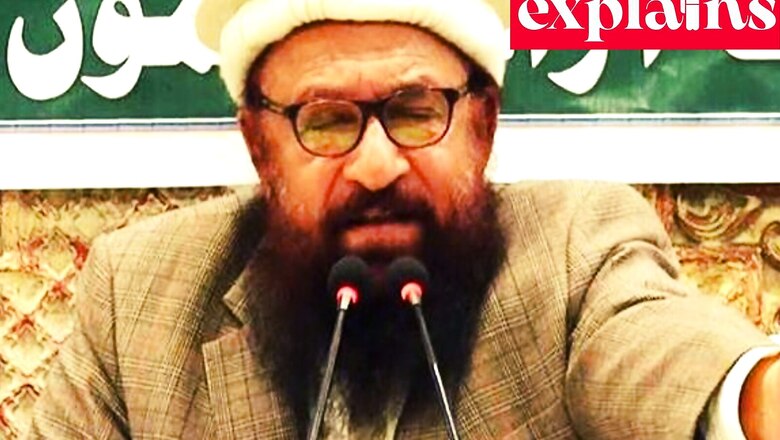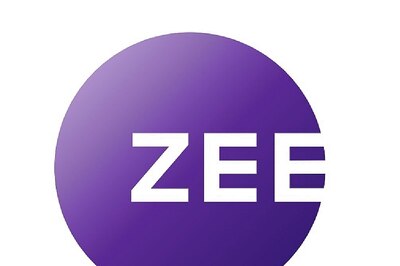
views
In a major development, Pakistan-based deputy leader of terror outfit Lashkar-e-Taiba (LeT) Abdul Rehman Makki has been designated as a global terrorist by the United Nations, subjecting him to an assets freeze, travel ban and arms embargo.
The UN Security Council’s 1267 Al Qaeda Sanctions Committee added 68-year-old Makki, the brother-in-law of JUD/LeT Chief Hafiz Muhammad Saeed, to its list of designated terrorists on Monday after China withdrew its hold on a joint proposal by India and the US.
Amid the development, let’s take a deeper look at who Makki is, and why this is an important development for India:
Who is Abdul Rehman Makki?
Makki has been a long-time aide to LeT’s Amir Hafiz Saeed, and is considered crucial to the organization’s operations. In addition to being a member of the Jamaat-Ul-Dawa/top Lashkar-e-Taiba’s family (he is Saeed’s brother-in-law), Makki has served as a member of the Shura and a member of the JuD’s central and proselytising teams. His primary strength is in raising funds for the LeT’s operations, a report by the Hindu states.
He was born in Bahawalpur, Punjab Province of Pakistan, and is the deputy chief of LeT and head of the political affairs wing of JUD/LeT. Makki has occupied various leadership roles within Lashkar-e-Taiba (LeT), a US-designated Foreign Terrorist Organisation (FTO). He has also played a role in raising funds for LeT operations.
According to a Rewards for Justice Program report, Makki, along with Hafiz Saeed, has also been working for the Difa-e-Pakistan Council (DPC), which is ‘tasked with defending Pakistan’s interests and agitating against drone attacks in Waziristan, Pakistan’.
The DPC has previously opposed the ‘war in Afghanistan’, and has also expressed opposition to NATO supplies passing through Pakistan.
Makki is also said to have close links to Taliban. In 2012, Times of India had reported that he was close to Taliban’s Mullah Omar and al-Qaeda leader Ayman al-Zawahiri. In Pakistan, he is well-known for his anti-India speeches, reports say.
In November 2010, the US Department of the Treasury had designated Makki as a Specially Designated Global Terrorist. As a result of this designation, among other consequences, all property, and interests in property, of Makki that are subject to US jurisdiction are blocked, and US persons are generally prohibited from engaging in any transactions with Makki.
In addition, it is a crime to knowingly provide, or attempt or conspire to provide, material support or resources to the FTO LeT, the US said.
The US Department of State’s Rewards for Justice programme is offering a reward of up to $2 million for information on Makki, also known as Abdulrahman Maki.
“In 2020, a Pakistani anti-terrorism court convicted Makki on one count of terrorism financing and sentenced him to prison. The United States continues to seek information on Makki because the Pakistani judicial system has released convicted LeT leaders and operatives in the past,” according to information on the Rewards for Justice website.
Why Is This Important for India?
In the early 1990s, the LeT first appeared in the Kashmir Valley. During the first decade, it concentrated on Jammu and Kashmir. The Red Fort attack, on the other hand, altered the perception of the LeT as a threat. Since then, India has blamed Makki for a number of attacks, both inside Kashmir and elsewhere in the country, the Hindu reports.
The list includes the 26/11 Mumbai attacks, the January 1, 2008 attack on the Rampur CRPF Camp, the Karan Nagar attack on February 12-13, 2018, the Khanpora attack in Baramulla on May 30, 2018, the Srinagar attack on June 14, 2018, and the Gurez attack on August 7, 2018.
India accuses Makki of raising funds, radicalising, and recruiting young men to attack India, specifically Jammu and Kashmir. The long list of anti-India attacks prompted India and the United States to label him a terrorist.
While the spotlight has been focused on Hafiz Saeed, a UN-designated terrorist, Makki had not been on the global terrorist list till.
Why Did China Block the Sanctions Repeatedly?
The Hindu in its 2022 report had quoted sources as saying that the proposal to sanction Makki by the UN Security Council was circulated to all members of the Council’s 1267 Committee under a “no-objection procedure” until June 16. At the last minute, China put a “technical hold” on the proposal, effectively killing the India-US plan to designate Makki as a global terrorist.
China, an all-weather friend of Islamabad, has repeatedly placed holds and blocks on bids by India and its allies to list Pakistan-based terrorists. Beijing has maintained its stance against terrorism, while justifying the holds as time needed to ‘study specific cases’.
What Did the Sanctions Committee Say?
The UNSC 1267 Sanctions Committee said Makki, wanted by the Indian Government, was listed as being associated with ISIL or Al-Qaida for participating in the financing, planning, facilitating, preparing, or perpetrating of acts or activities by, in conjunction with, under the name of, on behalf of, or in support of, recruiting for, otherwise supporting acts or activities of, and either owned or controlled, directly or indirectly, by, or otherwise supporting Lashkar-e-Taiba.
Makki was arrested on May 15, 2019 by the Pakistan Government and was under house arrest in Lahore. In 2020, a Pakistani court convicted Makki of terrorism financing and sentenced him to prison, the sanctions committee said.
The sanctions committee said that while Makki has held his leadership positions within LeT and JUD, the LeT has been responsible for or had involvement in prominent attacks including the Red Fort Attack in which six LeT terrorists had stormed Red Fort on December 22, 2000 and had opened indiscriminate fire on the security forces guarding the Fort.
In the Rampur Attack, five LeT terrorists had attacked a Central Reserve Police Force (CRPF) camp in Rampur on January 1, 2008 in which seven CRPF personnel and a rickshaw puller were killed.
Describing the 26/11 Mumbai terror attacks as the “most audacious attack by LeT in India”, the committee said 10 LeT terrorists from Pakistan entered via Arabian Sea in Mumbai with pre-decided targets out of which Amir Ajmal Kasab was caught alive, rest were killed.
In the Karan Nagar, Srinagar attack of February 12-13, 2018, LeT Fidayeen (suicide squad) stormed into CRPF (23 Battalion) camp at Karan Nagar area of Srinagar in which one CRPF trooper was killed one Policeman was injured.
In the Khanpora, Baramulla attack of May 30, 2018, three civilians were shot dead by LeT militants while in the Srinagar attack of June 14, 2018, senior journalist; Editor in Chief of Rising Kashmir, Shujaat Bukhari, and his two Personal Security Officers (PSOs) were shot by LeT terrorists, the committee said.
In the Gurez/ Bandipora attack of August 7, 2018, four Army soldiers including a Major were killed as Army foiled a major infiltration bid by heavily armed LeT militants along the Line of Control (LoC) in Gurez Sector of Bandipora District, Jammu and Kashmir.
What Action Has US Taken Against Makki?
In November 2010, the US Department of the Treasury had designated Makki as a Specially Designated Global Terrorist. As a result of this designation, among other consequences, all property, and interests in property, of Makki that are subject to US jurisdiction are blocked, and US persons are generally prohibited from engaging in any transactions with Makki.
In addition, it is a crime to knowingly provide, or attempt or conspire to provide, material support or resources to the FTO LeT, the US said.
With inputs from PTI
Read all the Latest Explainers here




















Comments
0 comment